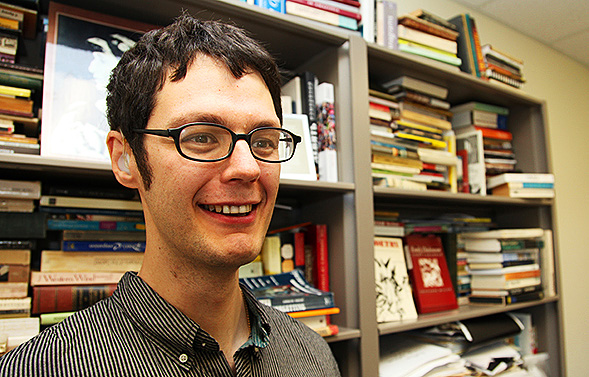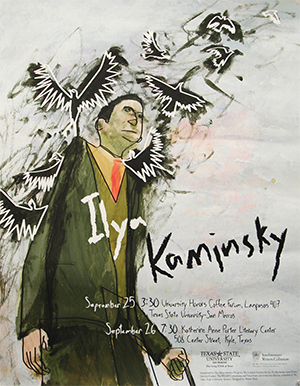Passion On and Off the Page
World-class writer Ilya Kaminsky creates a space for students to unravel the language of poetry.

Poetry often makes people feel adrift in a sea of confusing rhetoric, complicated symbolism, and a musicality that transforms English into a foreign language. For students, a place of refuge exists at San Diego State University with Ilya Kaminsky.

Kaminsky on campus
Kaminsky paints an amusing image of his office. “It is an island of books and more books,” he said. “There is always a book to grab from the wall to recite a poem aloud.” He creates a special space for students to come and think about authors and unravel their language.
“Our students love the passion they find in poetry,” Kaminsky said. “There is a special kind of attentiveness in all great poetry that makes one incredibly alive, incredibly alert to the world around us, more patient with it, more in love with it than ever before.”
Kaminsky began his love of poetry as a small child in Odessa, Russia. A place he describes as “a city of writers and sailors, literature and the sea.” His family was granted asylum by the American government when he was 16. By then poetry was already an important part of his life.
“I write in lines,” he said. “They become lines on receipts, on my hands, on a water bottle, on other people’s poems. Lines collect for years, but once in a while they discover that other lines are sexy and, well, the poems may come from that sort of a relationship. If I am lucky. Which isn’t often. But one has to have faith.”
International perspective
Faith and a little bit of luck brought Kaminsky to SDSU.
A member of the faculty since 2006, Kaminsky adds international literature and translation to students' intellectual discourse. The response from students attests to the talent of Kaminsky as a poet, but also a mentor.
“Ilya inspires students to envision themselves as artists on a world stage,” said Joanna Brooks, a fellow writer and chair of the department of English and Comparative Literature. “He works with them to tune into the musicality of poetry.”
He uses his own work, which this year alone has been published in Spain, Holland, Russia and China, to share his enthusiasm with students.
In one of many projects, Kaminsky brings the poetry of a famous Russian poet, Marina Tsvetaeva to life.
“What she gave us was the work of utter lyrical beauty,” Kaminsky said. “It was really a labor of love to write about her and to try and bring versions of her poems to American readers.”
By bringing Tsvetaeva's poems to campus, Kaminsky and his students share “many wonderful conversations about literature and politics, literature and exile, literature and spiritual matters,” he said.
These conversations with students are rooted in English, a language unknown to Kaminsky until he moved to America, a language that Kaminsky can scarcely hear because of a childhood illness that left him nearly deaf.
Dedication and success
Kaminsky’s mastery of English overshadows many native speakers with perfect hearing. He is an internationally recognized poet with literary prizes such as the Lannan Literary Fellowship and the Whiting Writer’s Award.
In fact, his success as a poet helped pay for his law school education. Before coming to SDSU, Kaminsky was a law clerk working for various non-profit organizations such as Legal and National Immigration Law Center.
“So, unlike the popular belief that poets are hopeless romantics, wild children (some, indeed, happily are!) most great poets are very accomplished thinkers,” Kaminsky said. For example, Aime Cesaire and William Bulter Yeats were senators and Johann Wolfgang Goethe was a prime minister in Germany.
This particular thinker has turned his keen eye towards San Diego. “SDSU students seem to have a great deal more at stake,” Kaminsky said. “Many are the first in their families to go to college or to graduate school. So there is a great deal more serious dedication to the discipline.”
This dedication has paid off for many.
With Kaminsky adding an international lens to their studies, students have excelled in publishing works of translation in noteable journals. Brandon Lussier, a SDSU graduate, won the coveted National Endowment for the Arts Fellowship in literary translation last year.
“I think that many of our students have realized that the love of poetry is a life-long adventure,” Kaminsky said. “And I for one love their seriousness and dedication to craft.”



